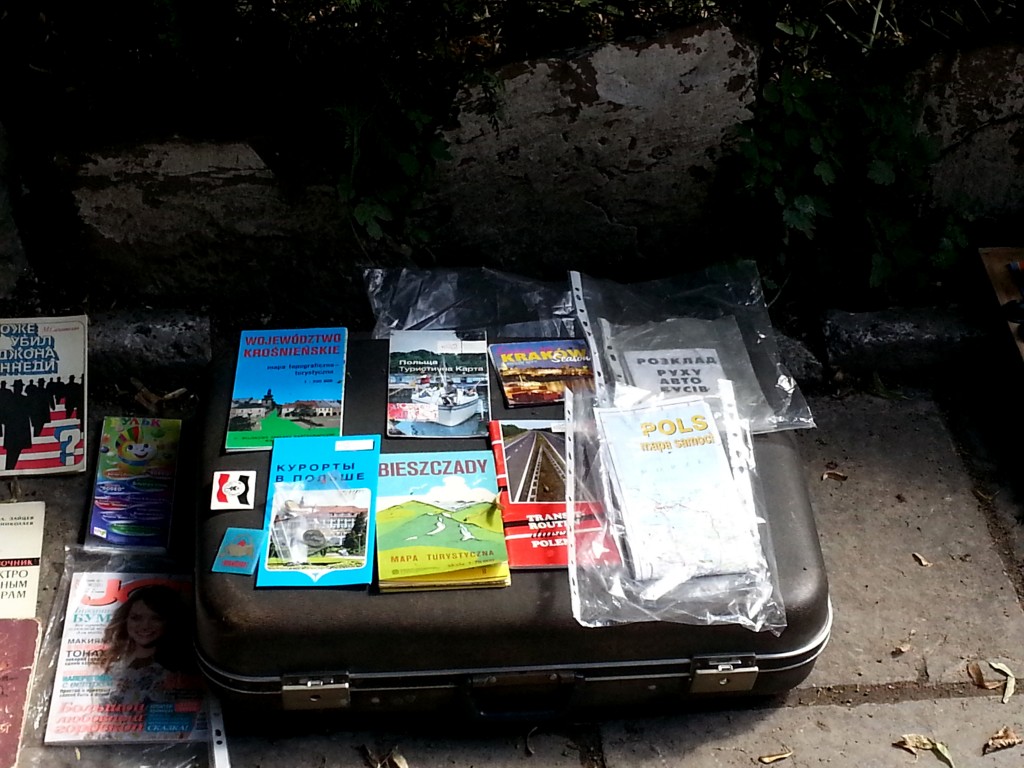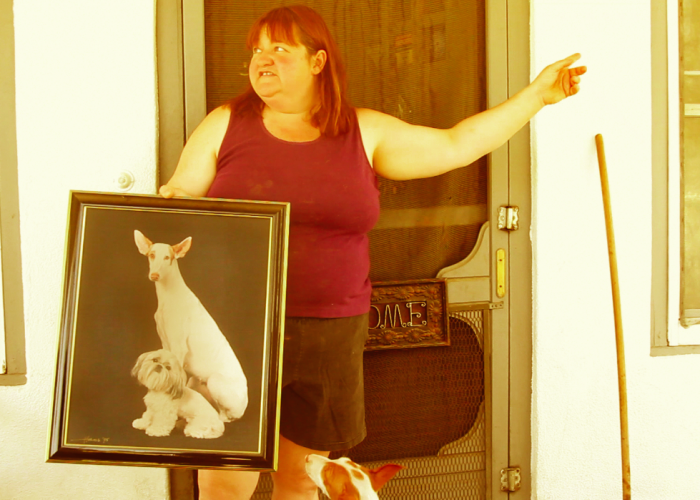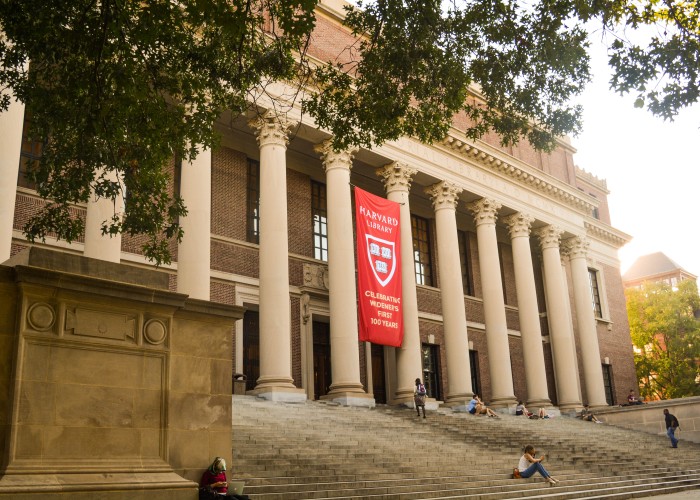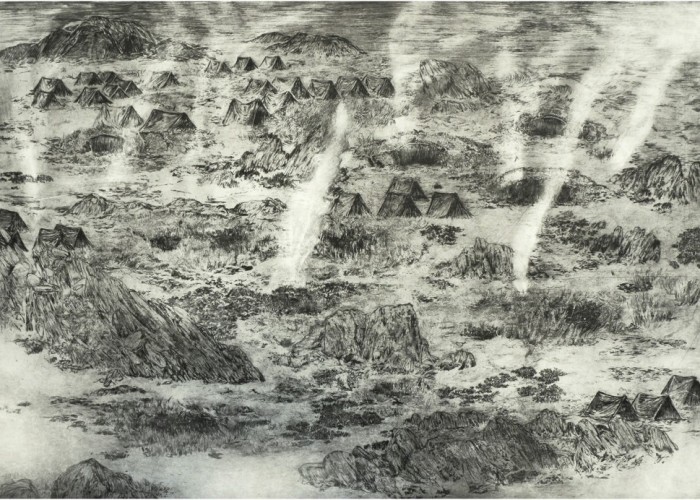Book Market [lviv]
Natalka Sniadanko
Translated from Ukrainian by Jennifer Croft
“No photos,” barks the geezer wearing the typically Soviet hat with the visor, synthetic leather sandals, an untucked shirt, and pants that haven’t been washed in ages.
He says it in Russian, but I answer in Ukrainian. “Too bad,” I say with a sigh and survey once more his wares arrayed across a sheet of pleather cast across the cobblestones: a shoddy photocopy of an abridged Mein Kampf in the very center, and next to it a treatise of similar quality on the Ukrainian liberation movement of the 1920s, both against the backdrop of a generous assortment of Komsomol, Young Pioneer, and World War II symbolism: badges, photographs, belts, and Soviet-style cockades. The selection on neighboring tables and mats is neither less varied nor less noteworthy. Soviet and Italian pop hits on vinyl; aluminum forks and spoons; Russian and Polish cookbooks spanning the whole of the past century; editions with and without illustrations of books on everything under the sun; fashion magazines from all over the world, ranging from issues that are relatively recent to veritable antiques; a wooden abacus beneath a taut, sign-bearing cord, whose words—“Danger! Archaeological investigation underway”—tremble a little in the wind. Standing pointedly in one of the aisles is one of those classic partly plaid bags on wheels that old folks cart their groceries in; it is capped with a handwritten note announcing the availability of copies of a Polish guidebook to Lviv originally published in 1920. I buy a copy. It’s all the same terrible-quality photocopies at exorbitant prices, but the contents of the guidebook are worth it: in addition to the detailed descriptions of the old streets and buildings, it also contains maps, indispensible in a city where street names change just about every other year. There are piano études by Chopin and Rossini’s biography alongside the memoirs of Soviet General Zhukov; Polish detective novels from the 70s in the original language as well as Polish writer Henryk Sienkiewicz in Russian translations; collections of reproductions of the works of Russian painter Vasily Surikov and rare editions of Ukrainian poet Vasily Stus, censored yet nominated for the Nobel Prize; a biographical publication in Russian called Marx’s Daughters and a Cossack history of Ukraine; an open suitcase displaying maps of the Bieszczady Mountains in Polish and a guide to Krakow in Russian; sun-bleached umbrellas advertising Ukrainian beer, shading books by Henry Miller, Darya Dontsova, and Agatha Christie.
And towering above it all, there is the great stone figure of Ivan Fedorov, who in the sixteenth century printed the first Ukrainian book. Traversing the books, brides in long white dresses climb the stairs to have their pictures taken in front of the monument while the booksellers sit back in their folding chairs reading whatever they happen to have gotten their hands on. I spot one engrossed in a book with a dingy green pleather cover, titled Alcoholism, author unnamed.
Perhaps out of all of contemporary Lviv, covered as it is in Soviet scabies, excessively sweetened for tourist tastes, this is where real multiculturalism has survived. It is here where German-Polish dictionaries from the Habsburg era rest beside works by the head of Ukraine’s first government and prominent historian Mikhail Grushevsky; Soviet Woman Magazine; old right- and left-wing pamphlets; the graphomaniacal ensembles of Soviet literati; and Ukrainian literature forbidden in the Soviet era, published by the Ukrainian diaspora around the world and smuggled into Lviv as contraband. And although this current array of bookly chaos is geared more toward tourists than toward bibliophiles, as it once was, the shift is understandable, was even inevitable, and it does not mar in any significant way the experience of buying books.
Further down, past Fedorov, there is the entrance into the city’s archives. Its massive wrought iron gates open for a moment, and the geezer with the hat with the visor appears in an aisle. Squinting a little, he glances at my camera—but I don’t quite manage to take my shot in time: the gates have shut again.
**
**
[ + bar ]
Writing Lessons for the Blind and Deaf (excerpt)
from the future Spanish of Mario Bellatin translated by David Shook
Josué’s mother was blind. Not always. She lost her eyes one at a time, starting... Read More »
The World Wide Widener
Patricia Marechal
The story of Widener Library starts with a tragedy. Widener is not only a place of study and one of the largest reservoirs of books and... Read More »
Lions
Iosi Havilio translated by Andrea Rosenberg
And in the middle of the day came the night . . . Down the hill, all made of shadows, the Protagonist... Read More »
Dubitation (a selection)
Martín Gambarotta Translated by Alexis Almeida
Here, the water is different, the artichoke
leaves are different, everything is
in essence, different,
but he who takes the bottle from the refrigerator
and... Read More »








 sending...
sending...